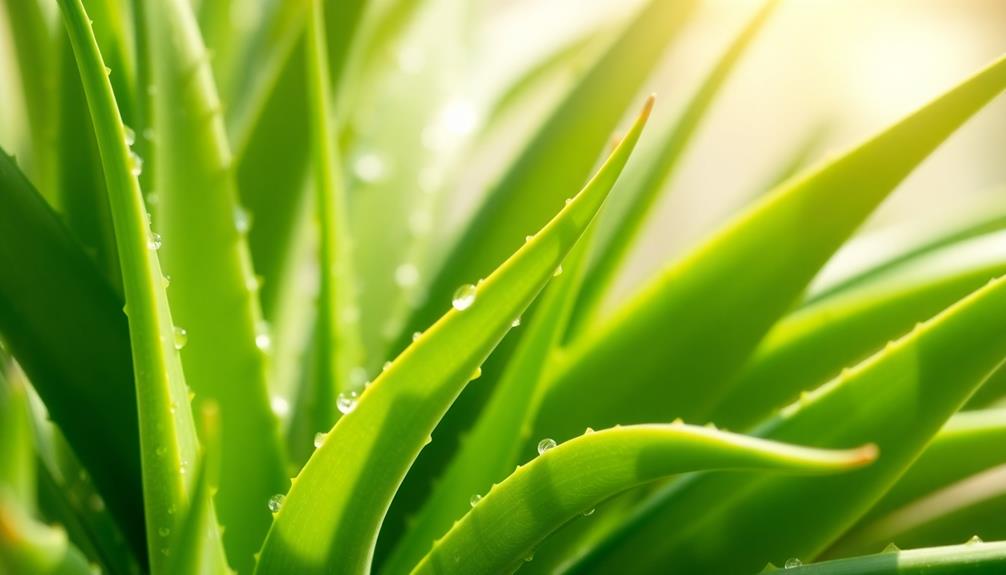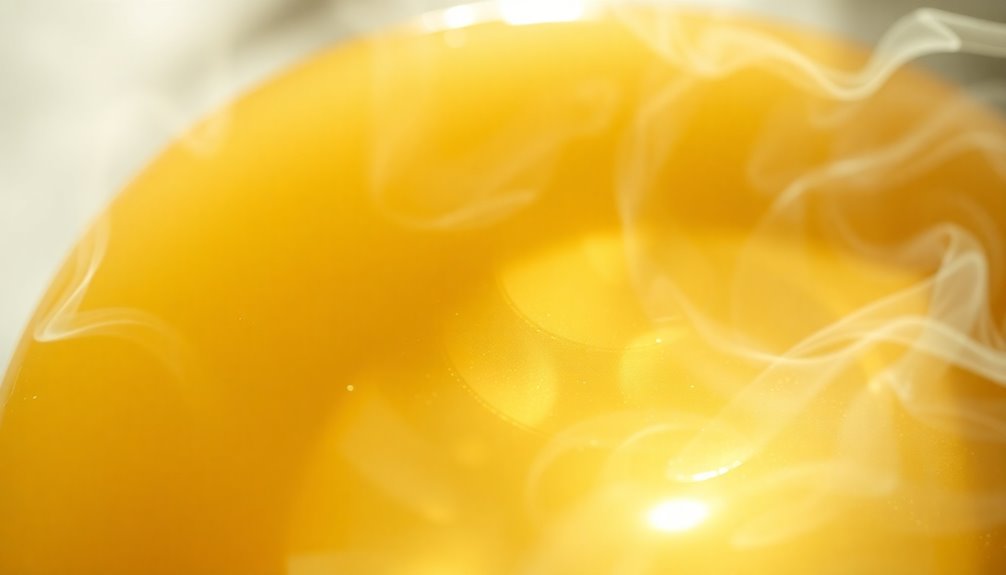Thyme smells amazing! It has a cheerful mix of earthy, minty, and citrusy fragrances, almost like a sunny herb garden. When you take a whiff, you might notice bright lemon notes and hints of rosemary, paired with fresh mint undertones. Some people also describe it as having a cozy, spicy smell. Thyme is commonly found in kitchens, enhancing dishes with its delightful aroma, and in perfumes, where it adds depth. Its scent brings joy and calm wherever it is. There's so much more to explore about thyme and its uses, so stick around for more exciting details! Beyond its culinary and aromatic uses, thyme also complements other scents exceptionally well. In particular, it blends beautifully with the *blue tansy scent profile*, where the soothing, slightly sweet herbal notes of blue tansy meet thyme’s uplifting and fresh fragrance to create a balanced and deeply relaxing experience. Together, these scents transport you to a serene, nature-filled space, perfect for unwinding and sparking creativity.
Key Takeaways
- Thyme has a fresh, earthy aroma that combines minty, citrusy, and rosemary notes, reminiscent of a sunlit herb garden.
- The scent features high notes of lemon and rosemary with deeper undertones of hyacinth and coriander, adding complexity.
- Thyme's fragrance is invigorating and soothing, promoting relaxation in environments like gardens and kitchens.
- The essential oil of thyme contains thymol, which contributes to its spicy, herbaceous quality and enhances its aromatic profile.
- Thyme's scent is associated with calmness and clarity, historically symbolizing courage and strength in ancient cultures.
Introduction
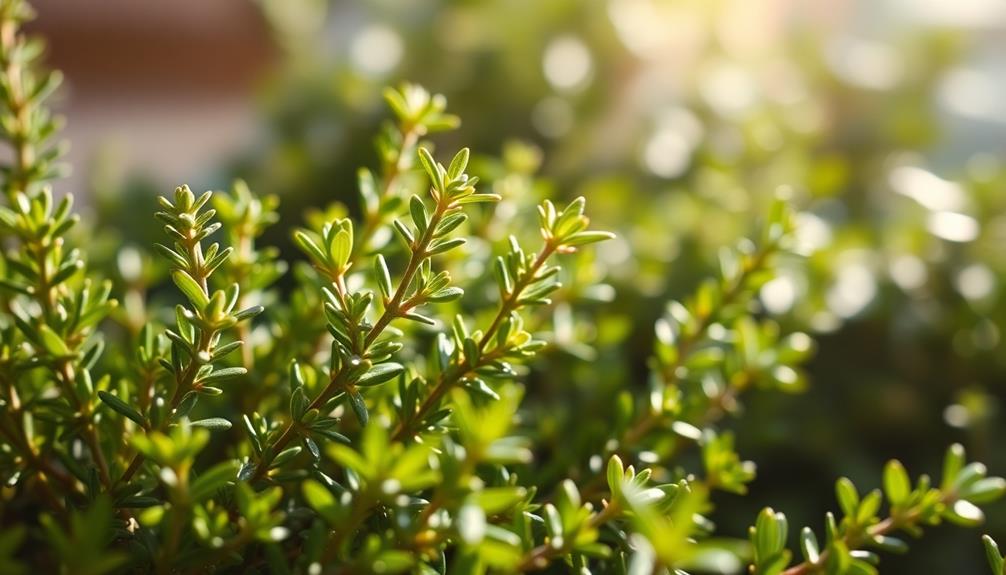
When you think about herbs that add depth to your cooking and fragrance, thyme often comes to mind. This amazing herb isn't only great in the kitchen, but it also has a wonderful aroma that can brighten up any space.
Thyme's scent is a delightful mix of earthy, minty, and citrusy notes. You might notice high notes that remind you of lemon and rosemary, balanced with soft hints of coriander and even delicate flowers.
When you cook with thyme, it enhances your dishes without being too strong, making it perfect for soups, stews, and roasted meats. Its unique smell can lift your spirits and make your meals feel extra special.
But thyme isn't just for cooking! Its fragrant oils are often found in perfumes and colognes, adding a touch of freshness and warmth.
Many people love how thyme pairs beautifully with other scents, creating a complex and inviting fragrance. So next time you catch a whiff of thyme, remember, it's more than just an herb. It's a little burst of joy for your senses, whether in your dish or in the air around you!
Description of the Smell
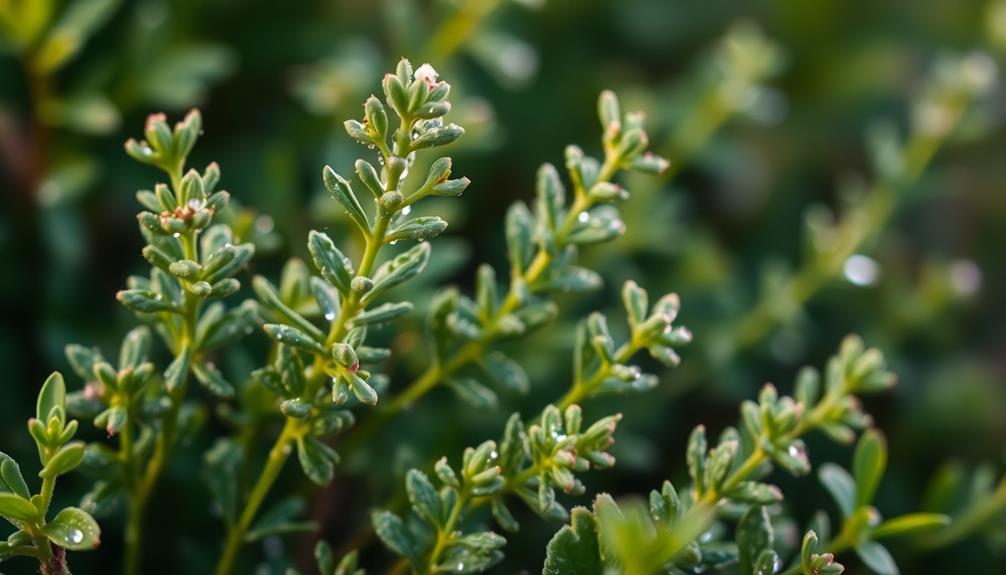
Thyme's smell is a captivating blend that can instantly transport you to a sunlit herb garden. When you take a deep breath, you'll notice its fresh, earthy scent, which is both invigorating and soothing. This fragrant herb brings a burst of lemon and hints of rosemary that create a bright and uplifting fragrance. You might even catch a whiff of minty and citrusy notes dancing around, making you feel refreshed and energized.
As you explore thyme's aroma further, you'll discover the delicate low notes of hyacinth blossoms and coriander, adding unique depth and complexity. These layers work together to create a scent that feels both warm and inviting.
If you've ever smelled thyme essential oil, you know it enhances this aroma, giving it a spicy, herbaceous quality often found in perfumes.
Thyme's fragrance isn't just for your garden; it's used in cooking and scented products, showing how versatile this fragrant herb truly is. Whether you're whipping up a delicious dish or simply enjoying its scent, thyme offers a joyful experience that brightens your day.
Source and Composition
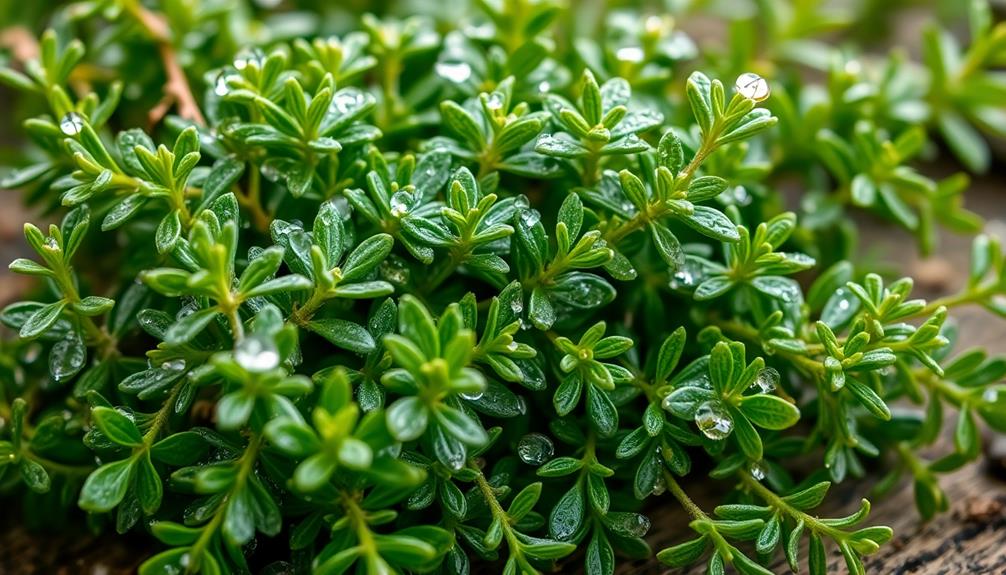
Derived from the leaves of the Thymus vulgaris plant, thyme's distinctive aroma comes from its volatile oil content. This oil is what gives thyme its fresh, earthy, and herbal scent, with delightful minty and citrusy notes. You'll find that the oil ranges from 0.8% to 2%, and it's packed with key aromatic compounds like thymol, which help create that signature fragrance.
When you take a deep breath of thyme, you might notice high notes of rosemary and lemon. These bright scents blend beautifully with low notes of delicate hyacinth blossoms and refreshing morning dew. Isn't that fascinating? Each variety of thyme can smell a little different. Some might offer more floral or spicy undertones, making the experience even more exciting!
Thyme's lovely fragrance isn't just for cooking. It's also used in perfumery, where it enhances both masculine and unisex fragrances.
Typical Scenarios or Environments

There's something enchanting about the scent of thyme that transforms ordinary settings into aromatic havens.
Imagine walking through a sunny garden filled with common thyme. As you brush against its leaves, a fresh, earthy aroma fills the air, instantly making you feel more relaxed. This delightful scent can turn any simple moment into something special.
In the kitchen, thyme works its magic too. You might be preparing a savory Mediterranean dish, and as you add thyme, the kitchen fills with its minty, citrusy fragrance. It's like a warm hug for your senses!
Thyme isn't just for cooking, though. It's also found in lovely perfumes. When you smell a scent with thyme in it, you might notice its bright lemon notes mixed with soft floral hints, creating a wonderful experience.
Whether you're in a bustling kitchen, a serene garden, or exploring fragrance shops, the scent of thyme is always inviting. It captures the spirit of nature, bringing joy and calm to your surroundings.
Emotional or Cultural Associations
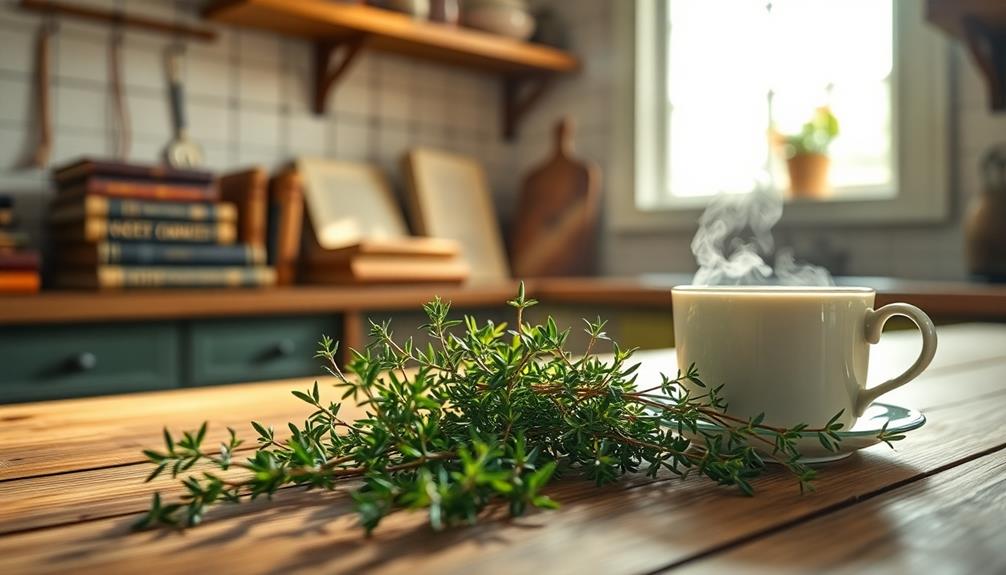
The scent of thyme brings with it a rich tapestry of emotions and cultural significance that resonates through history. When you breathe in its fresh, earthy aroma, you might feel a sense of calm and clarity. This uplifting sensation can brighten your mood and help you feel more alive.
In ancient Greek culture, thyme was a special herb, its name even comes from the Greek word "thymon," symbolizing courage and strength. People believed it represented heroism, making it a powerful reminder of bravery.
Thyme wasn't just for cooking, though! Its wonderful fragrance made it a popular choice in incense during religious ceremonies. This use reinforced its role as a purifying agent, adding to its cultural importance.
In many traditions, thyme is also linked to love and passion. It's often given as a gift to loved ones, showing affection in a heartfelt way.
You can even find thyme in perfumes, where its distinct aroma adds depth and emotion to fragrances. So, the next time you catch a whiff of thyme, remember the rich emotions and cultural connections it carries with it!
Health or Safety Considerations
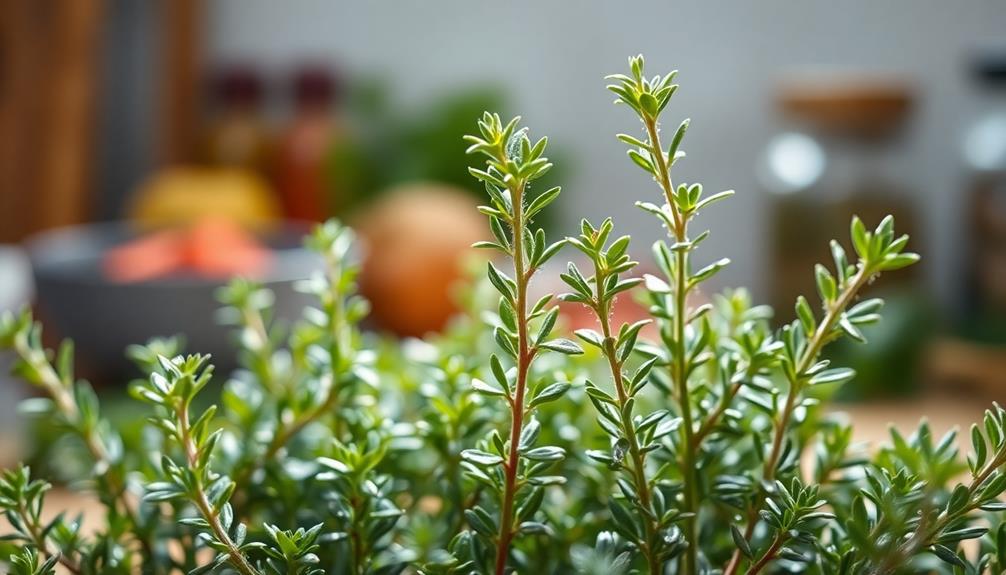
While thyme's rich cultural significance and emotional resonance make it a beloved herb, it's important to consider some health and safety aspects as well. This herb that's praised for its flavor and aroma also contains thymol. This compound is known for its antimicrobial properties, which can help promote respiratory health and calm airways. That sounds great, doesn't it?
However, be cautious! The essential oils in thyme may cause skin irritation for some people, so it's smart to do a patch test before applying it to your skin.
When it comes to eating thyme, moderation is key. While it's generally safe, large amounts might upset your tummy or trigger allergic reactions in sensitive folks.
If you're pregnant or breastfeeding, it's best to consult a healthcare professional before using concentrated thyme extracts or essential oils. After all, safety comes first!
Lastly, always ensure thyme products are sourced from reputable suppliers. This helps you avoid any harmful substances or pesticides.
Final Thoughts
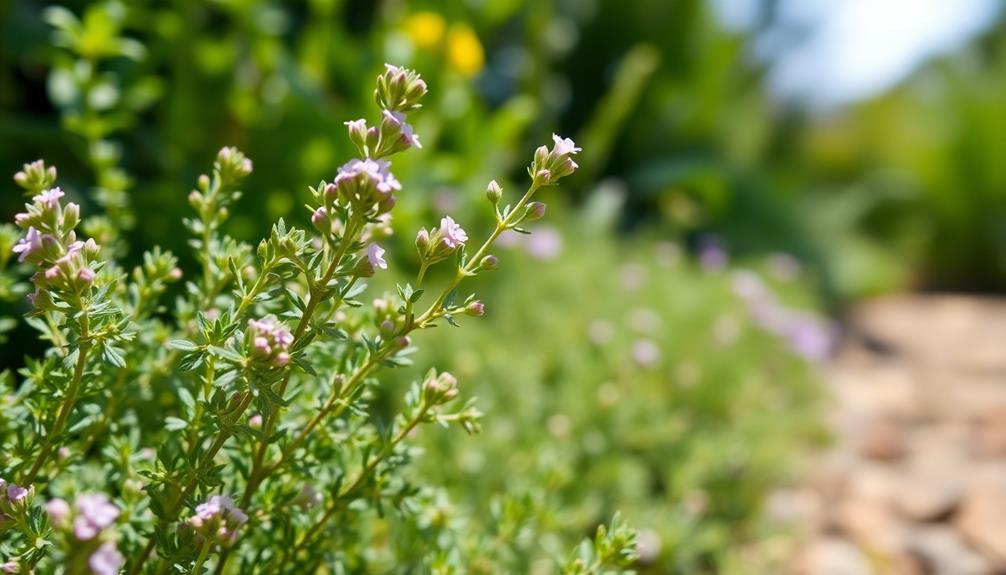
Thyme's captivating aroma and versatility make it a standout herb in both culinary and aromatic applications. When you think of Garden Thyme, imagine a fresh, earthy scent that dances between minty and citrusy notes. It's like a delightful bouquet of flavors! You might even notice hints of rosemary and lavender, adding to its charm.
The high notes of thyme and lemon mix beautifully with the low notes of coriander and delicate hyacinth blossoms.
Using thyme in your cooking can turn ordinary dishes into extraordinary ones. Its unique aroma can uplift your meals, making them smell and taste fantastic.
Plus, thyme isn't just for the kitchen! You'll find it in many perfumes, especially those designed for men and unisex scents. The blend of thyme's herbal qualities adds complexity and depth, making fragrances truly unique.
Frequently Asked Questions
How Do You Describe the Smell of Thyme?
When you describe the smell of thyme, you'll find it's fresh and herbaceous, with earthy and minty notes. It's uplifting and invigorating, perfect for enhancing both culinary dishes and aromatic experiences.
What Is Thyme Scent?
Thyme's scent captivates you with its fresh, floral notes that blend lemon and rosemary. You'll notice earthy and minty undertones, creating a versatile aroma perfect for culinary dishes or enhancing your favorite fragrance.
What Is the Taste and Aroma of Thyme?
When you taste thyme, you'll notice its earthy, slightly minty flavor with hints of citrus. Its aroma combines herbal notes with a warm, spicy undertone, enhancing both your dishes and your cooking experience remarkably.
Does Thyme Smell Like Lavender?
Thyme doesn't smell like lavender. While both belong to the mint family, thyme has an earthy, herbal aroma with minty notes, whereas lavender offers a sweet, floral scent. You'll easily notice their distinct differences.

